- Home
- William Bell
Forbidden City Page 12
Forbidden City Read online
Page 12
They ordered the students to clear the square or face the consequences, as if they hadn’t been doing that for hours.
Xin-hua and her friends had joined their contingent from Ren Min Da Xue, People’s University. The student leaders had a meeting and decided to do as the PLA asked, but when they reported to their various groups, a few hundred students refused to leave. They wanted to offer passive resistance to the PLA.
Walking arm in arm, Xin-hua and the other thousands of students slowly filed out of the square to the south. They were beaten with truncheons by police as they left. Behind them they heard the AK 47s open fire. They knew the friends and classmates who had stayed were being massacred where they stood.
Many of them circled around to the north and west, entering Chang An Avenue and moving east again. They got as far as the Beijing Hotel, where masses of citizens and students were surging towards them, getting shot at, then fleeing east, like an enraged tidal flow.
Not long after the gunfire in the square dwindled, bonfires began to appear.
“Bonfires?” I interrupted her.
“Yes. At first we didn’t know what those were. Later we heard that PLA were burning the bodies.”
She stopped talking. She was weeping quietly. I swallowed hard.
Burning the bodies.
“Why would they do that?” I finally choked out.
“Because they will say that it didn’t happen. That they didn’t kill anyone.”
I let that go. Obviously Xin-hua was so overcome with grief and fear and outrage that she wasn’t being sensible. Nobody, I thought, could possibly deny what the PLA was doing.
I felt angrier than I ever have. “Nobody will be able to pretend this isn’t happening,” I vowed, “because I’ve got it on tape. And I’m going to see that the tapes, somehow, get back to Canada.”
Xin-hua looked straight into my eyes. “That is what we are hoping, Shan Da.”
I suddenly had a thought. “Hey, wait! Maybe the Americans are still on the radio!”
I shut off the recorder and grabbed the two-way. I switched to five.
The Americans were still at their stations — except for the one who had been in the square and she was back at the Beijing Hotel. As soon as I raised them I asked about my dad, but they knew nothing yet, about him or Eddie.
For the rest of that day Xin-hua and I monitored the Americans, using the tape recorder and making notes. All morning the chaos in the streets continued. There was still lots of action right in front of the hotel. By ten o’clock there were at least twenty bodies in the street. The soldiers were even firing on people who came in to get the wounded.
Around lunchtime three of Xin-hua’s friends came by. They looked bedraggled and exhausted. As soon as they came in I knew who had bandaged my leg.
“Hong!” I blurted.
All four of them stared at me like I’d lost my mind. Xin-hua introduced them — Yang, Liu and Nie. Nie was the guy in the red baseball cap I had talked to in the square.
“How is your friend?” I asked him. I was smart enough not to call her Lan.
“She is home from hospital now,” he said. “I am okay, too.”
The students sat down and they all started talking at once — passing on the latest news and rumours, I guessed. At one point Xin-hua turned to me and said sadly, “PLA have torn down the Goddess of Democracy.”
After the gabble wound down the guys hooked in to the two-way and listened carefully while Xiao Nie unwrapped my bandages, washed out the wound, and redressed it. The bullet had gouged out a bloody trench in my calf about the size of my thumb. I wondered if I’d ever be able to walk normally again.
I asked Xiao Nie where the bathroom was. After outfitting me with a hat and sunglasses to hide my foreignness he took me outside and we hobbled through the courtyard, me with my arm around his shoulders. I looked around but I couldn’t see any kind of outhouse. Xiao Nie took me to the door in the wall — the Chinese call it a “gate”, too — and helped me through. Overhead we heard the whok-whok-whok-whok of a helicopter. We struggled along the hu tong for a few minutes. The pain in my head was so bad I kept my head down and held my eyes clamped shut most of the time. Finally we stopped outside a small brick building. You could tell long before you got to it that it was a public bathroom. I read the big character meaning male painted on the brick.
We got back to the house to find that Nai-nai had made us a lunch of noodles and everybody slurped and chewed away. After lunch the three guys left.
The war in the streets went on all afternoon and into the early evening. By nightfall the square was full of tanks and from what we could gather the Americans had stopped transmitting — the only people left there were soldiers.
Xin-hua woke me up around ten. I had laid my head on my arms at the table to rest for a second and had fallen straight to sleep.
“Go to bed now, Shan Da.”
A small cot had been made up between the table and the screen. Xin-hua disappeared behind the screen after saying good night, leaving me a flashlight and turning off the single overhead light. I hopped to the cot, carefully lowered myself down and struggled out of my clothes.
I lay back and switched off the flashlight. As I stared into the dark, gunfire sounded in the distance, like murderous firecrackers. The citizens were still fighting in the streets. The soldiers were still killing them. But as I lay there I had only one thought. When would it end, so I could go out and start looking for my dad?
I spent the fifth hobbling and moping around, wearing out batteries on the two-way trying to raise somebody, lying down when my head and leg shouted too loud at me, sleeping fitfully. The sky was overcast and the big wind swirled dust devils around the courtyard.
I took a look at myself in a little mirror in the corner near the washstand. My nose was one big red scab, one eye had an ugly yellow circle around it, and my chin was scraped.
Xin-hua was nowhere to be seen. Nai-nai drifted around doing housework, cooking, going out and in the door. I got in her way a lot, but she was smiling and polite and worried-looking. I felt grumpy and frustrated and scared.
I woke up at six the next morning. A few seconds after I opened my eyes I wished I hadn’t wakened at all. I groaned. My wound hurt so much I could hardly move it.
Xin-hua and Nai-nai were up already. Nai-nai was at the stove, filling one of the big thermoses from the kettle. Xin-hua sat at the table, as if she’d been there all night. She was dressed in clean clothes now, grey slacks and a yellow shirt.
She must have heard me groan. She looked up at me and said good morning.
“Hi,” I managed, wondering how I was going to get out of bed and dress with her a few feet away from me.
As if reading my mind, Xin-hua said something to her grandmother and the both of them lifted the screen into place between me and the table. I struggled to a sitting position and pulled on my pants and socks, then balanced on my left leg and put on the shirt. After slipping on my shoes I hopped out from around the screen and plopped down into one of the chairs.
I must have winced, because Xin-hua asked, “Your leg is more worse?”
I nodded.
“Give you these. Xiao Nie left them for you,” she said, handing me two white pills.
Nai-nai brought me a cup of hot water and I swallowed the pills.
Xin-hua was fiddling with the dial of a radio I hadn’t seen yesterday.
“Shortwave?”
“Yes. This morning before it got light I back to my university to get some things. My classmate told me government is stopping Voice of America and BBC. I can’t get those.”
“Jamming,” I said.
“What?”
“It’s called jamming”. I remembered what Xinhua had said the day before yesterday about the PLA burning the bodies of the people they had shot in the square. Destroying the evidence. “The government must be jamming the shortwave broadcasts from abroad so the truth doesn’t get in.”
Xin-hua nodded. It’s kin
d of crazy, I thought to myself. The news gets out of China through foreigners smuggling out videos, giving eyewitness accounts when they get to Hong Kong or Tokyo or San Francisco, or just making long distance phone calls, then the news comes back in again on shortwave. Did Deng and Li and the gang really think they could stop it? I looked at all the electronic gear on the table — battery packs, two-way radio, video and audio recorders, the shortwave. What kind of world did those guys think they were living in, anyway?
The radio was a Chinese model and was plugged into the light socket above the table. It hissed and sputtered, then shouted Chinese, then hissed some more as Xin-hua turned the dial. Finally she shut it off.
I turned on the two-way and called over five. “Hello. Anybody there? Over.”
I tried three or four times on all the channels but got nothing. I switched back to five and left the set on.
Nai-nai brought a bowl of rice gruel to me. I nodded my thanks and she went out into the courtyard. The gruel steamed up into my face. The steam felt so good on my scraped skin I held my face over the bowl for a moment. When I had slurped the last grains out of the bowl Xin-hua got up and went to the desk. She brought back a black lacquered cane.
“This was my grandfather’s,” she said. “Nai-nai said you should use it.”
“Great,” I said, and pulled myself up. I tried out the cane, hobbling around the house. It was hard to use because if I wasn’t careful I lost my balance when I stepped onto my good leg, but it sure was better than hopping. My headache was pretty mild that morning, or maybe it only seemed that way because my leg hurt so much.
I got my hat and sunglasses and struggled outside to use the tap to wash my face. Nai-nai was bent over a wash tub, both sleeves pushed up to her elbows, washing clothes on a wooden wash-board. I recognized the shirt she was grinding up and down on the washboard. It was mine. There were two women with her, sitting on either side of her on low stools. One was washing rice and the other was doing something with some celery. Both women were grey haired. One was a little bit chubby, the other as thin as Nai-nai, but taller. The larger woman was dressed in black but the other was wearing blue slacks and a white shirt.
As soon as they saw me they broke into a storm of gabble and got to their feet. They approached me smiling and talking to Nai-nai as if I wasn’t really there. Both of them touched my hair as they talked. I figured that they were treating me like a post with blond hair and blue eyes because they thought I couldn’t talk Chinese, so I said hello to them.
They laughed, surprised that words they understood came out of my mouth. The thin one pointed to my leg. “Nin shen ti hao bu hao?” she asked. Is your health good?
“Zhe ge bu hao,” I told her, pointing to my leg. Even the walk from the house had increased the pain.
While they jabbered away — I could pick out quite a few of their words, so I guessed they were Beijingese — I bent and washed my face at the tap and tried to clean my teeth with my finger. Half the courtyard was in shadow because the sun hadn’t climbed high enough to throw its rays over the wall yet. The houses on either side seemed to be identical to Nai-nai’s house. Each one had a bike leaning against it. The courtyard was swept so clean you could have found a button in two seconds. I liked the courtyard. It was private, quiet — except for the chattering of the three women, who were back to work — and peaceful. I felt safe there because of the wall between the yard and the alley.
I hobbled towards the wooden door and carefully negotiated my way into the hu tong. It was already pretty hot out. I made my way along the curved alley. It was about the width of one and a half cars, with high walls on both sides, naturally, and a sort of asphalt surface. It was swept clean, too.
I passed an old woman pushing a bamboo baby carriage, keeping my head down. She nodded to me. Nearer the public bathroom a couple of kids wearing monkey masks were play fighting with staves.
On my way back to Nai-nai’s gate I heard someone talking through a loud-hailer. His words bounced and echoed down the canyon of the hu tong. I made my painful way past the gate, continuing around the curve for about twenty meters to where the alley straightened out. Just along from there was an intersection. Someone was selling Chinese celery from the back of one of those vehicles that looked like a giant tricycle with a flat platform behind the rider — a ping ban che. On the opposite corner an old man squatted next to a carefully stacked pile of round watermelons. Beside the ping ban che about two dozen people had gathered around a young man who stood astride a bike. He was talking to them through the loud-hailer. He stopped when machine-gun fire popped rapidly in the distance, then started up again. When he finished, he mounted the bike and rode off.
When I got back to the house I asked Xin-hua if she knew what that guy might have been doing. She told me that the young man was probably a news spreader. People like him were going around the city, passing on the latest news at a free market or hu tong corner, then riding on to the next spot. I knew that what they were doing was illegal, what Lao Xu had called “spreading rumours”, and that if they were caught they’d be in big trouble. Maybe even be shot.
“We have no other way to find out what is happening,” she said. “Only one radio station now and it is all lies. Same thing with TV.”
I had to lie down. My leg was killing me and my headache was worse. My cot had been folded up and put away so Xin-hua helped me up onto the kang. She brought me a couple more of the pills. I swallowed them and lay back.
I felt trapped and totally frustrated and sick with worry about my dad. Maybe, I thought, maybe I should just walk along the hu tong until I got to a main street and hail a cab or get on a bus or something. One thing was sure, I couldn’t walk or take a bicycle. But I could make it to the Beijing Hotel some how.
But between me and the hotel was Tian An Men Square, which was now full of tanks and PLA.
Well, maybe I could skirt the square, just take a long way around. Then I remembered. There were barricades on all the roads leading to the square. And in other places, all over the city. Maybe buses weren’t running yet. Maybe taxis weren’t either. I wondered if I could get Xin-hua to help me back to the hotel.
My thoughts were interrupted by a long burst of AK 47 fire, then a couple of short bursts. I flinched, feeling suddenly afraid. Maybe it wasn’t so safe for anybody to be out on the main streets, I thought.
After lunch — noodles again — Xin-hua’s friends came by. I was up again, not because I felt any better but because it was too depressing lying on the bed behind the screen.
Xiao Nie immediately examined my leg. He rolled up the pant leg and slowly unwound the bandage while the others watched. It stung like mad because the dried blood had glued the bandage and my leg hairs and the skin all together. I felt stupid, trying not to howl in the presence of three people who had been shot at a couple of days ago. By the time the bandage was off I was breathing hard and blinking hard, hoping no one noticed I was about to faint. I twisted my leg a bit and looked at the wound. It was all dark red with old blood and sort of an ugly yellow colour tinged the muscle around it. There was still a fair amount of swelling, too.
“It’s better,” Xiao Nie said.
“It feels worse.”
“That mean it’s healing.”
He said something in Chinese and Xiao Yang, a small guy with thick horn-rimmed glasses handed him a small green canvas bag. Xiao Nie rummaged around inside and came out with a paper packet. He unfolded it and sprinkled some white powder on the wound. Then he reached into his shirt pocket and drew out two little paper envelopes.
Putting them on the table beside the hissing two-way radio he said, “Take these. One from each package every four hours.”
“What are they?” I was imagining some ancient Chinese medicine like eye of newt or powdered tiger’s teeth or something.
“One is painkiller. The another one is tetracycline, antibiotic. Now I give you this treatment.”
From his little green bag Xiao Nie removed a clear
plastic sack with a lot of different-length needles in it and a bottle of clear liquid. “Needles for the acupuncture,” he explained. “It will ease your pain and help the swell to go away.”
“Acupuncture? Are you kidding?” I wasn’t too fussy about the idea of anyone sticking needles into me. I couldn’t believe a real doctor was using voodoo stuff like that.
“I thought you went to the western-style medical college,” I said to Xiao Nie. In China there are also traditional medical colleges where you can go and learn about roots and berries and needles.
“Yes, Shan Da. Acupuncture is good. Many of Western doctors are using it.”
Maybe so, but not on me, I thought. My leg didn’t agree with me. As soon as Xiao Nie finished his sentence, a firecracker of pain flared in my wound.
“Does it hurt?”
“Little bit of pain, but goes away fast.”
“Okay, try it,” I said. What did I have to lose? “But if I say stop, stop. Okay?”
“Very okay, Shan Da.”
Xiao Nie sat down across from me — which surprised me. How was he going to stick needles in my leg from his chair? He took the needles from the little plastic bag and spread them out. Then he unscrewed the cap of the bottle.
“Give me your left hand, please, Shan Da.”
I did as he asked, curious. He turned my hand palm down on the table and took my wrist, feeling around with his thumb where hand and wrist met. He seemed to find a spot he liked. Holding my arm firmly, he chose a needle, about ten centimetres long and dipped the point into the liquid. I guessed that was to sterilize it.
He put the needle against my skin where his thumb had been and pushed it into my wrist. It stung like it does when — well, when you’re getting a needle. He twirled the needle slowly clockwise, then counterclockwise. The sting went away.
Within a few minutes he had placed three needles around the first one. He looked up and smiled. “Any paining, Shan Da?”

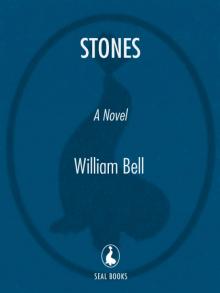 Stones
Stones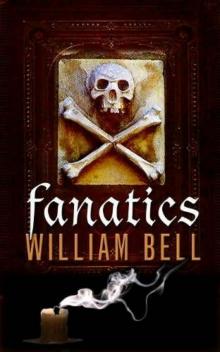 Fanatics
Fanatics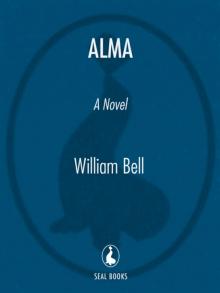 Alma
Alma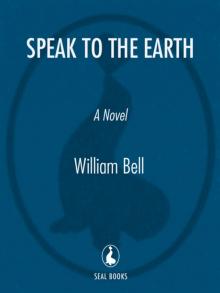 Speak to the Earth
Speak to the Earth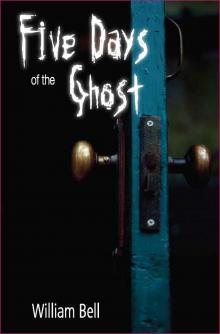 Five Days of the Ghost
Five Days of the Ghost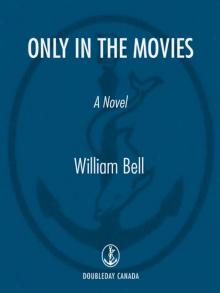 Only in the Movies
Only in the Movies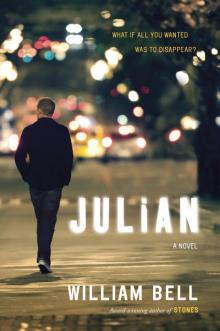 Julian
Julian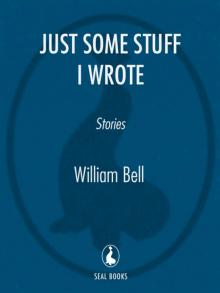 Just Some Stuff I Wrote
Just Some Stuff I Wrote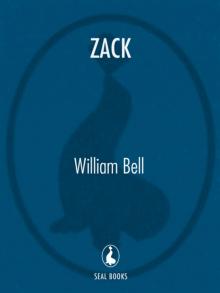 Zack
Zack Forbidden City
Forbidden City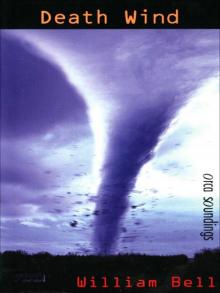 Death Wind
Death Wind No Signature
No Signature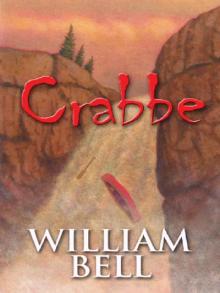 Crabbe
Crabbe